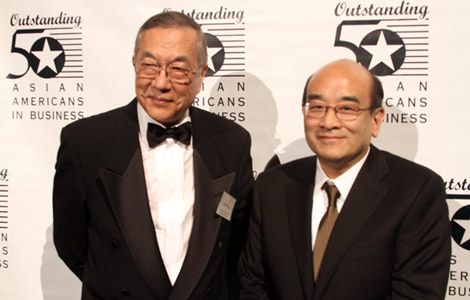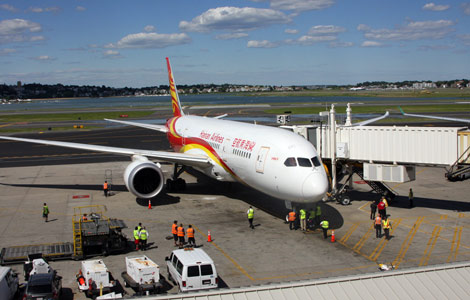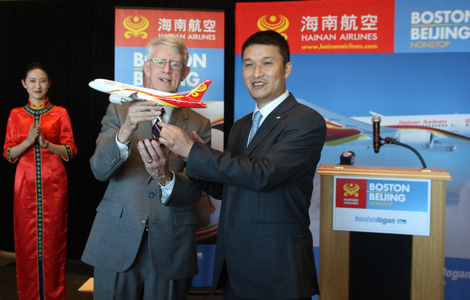Neighboring countries urged not to stir tensions
Updated: 2014-06-23 07:52
By Zhao Shengnan (China Daily)
|
||||||||
Experts said nations should resort to dialogue to resolve territorial disputes
Amid escalating tensions in the South and East China seas, a senior Chinese military officer told smaller countries - emboldened by backing from other major world powers - not to stir up trouble.
"We have to protect our drilling rig," Sun Jianguo, deputy chief of the General Staff of the People's Liberation Army, told reporters on Sunday when responding to questions about the China-Vietnam standoff over a Chinese oil rig in the South China Sea.
"We cannot agree with the US' claims that China is bullying Vietnam," he said.
During a speech at the World Peace Forum in Beijing, Sun said smaller countries should not bully others with support from major powers. Smaller countries have the responsibility not to hijack regional security for selfish interests, he added.
Sun also said major countries should not resort to military force in an irresponsible and reckless manner that leaves a mess behind in the region.
Sun's remarks were one of several responses from high-level PLA generals about the simmering tensions between China and Vietnam since early May over the Chinese rig operating near the Xisha Islands. Violent anti-China protests in Vietnam have killed four Chinese citizens and injured many others.
Rare opportunity
Observers said those involved in disputes should take advantage of rare opportunities to resolve maritime rows through direct communication, and that external powers' interference in regional issues increases confrontation.
Jawhar Mohamed, chairman of the Institute of Strategic and International Studies in Malaysia, said the priority now is to cool the tensions, and alliances should not be strengthened.
"A military alliance is inclusive. It is me versus you, or me and you versus the others," he said.
Vietnam is not an ally of Washington, but the timing of the China-Vietnam standoff left Chinese experts believing that Washington emboldened Hanoi to challenge China.
Vietnam began harassing the Chinese rig near China's Xisha Islands shortly after US President Barack Obama's Asia tour, which underscored Washington's commitment to an Asia rebalancing strategy.
Sun asked for respect from the US, which has been conducting frequent reconnaissance near China.
He said that the law of the jungle should be abandoned in international exchanges and called for dialogue to resolve problems on the basis of equality and mutual respect.
The Philippines submitted its South China Sea disputes with China to the International Court of Justice in March. Earlier this month, Hanoi said it may resolve its maritime issues with China through an international lawsuit too.
Beijing has made it clear that it would not accept it nor attend international arbitration.
Wu Shicun, president of the National Institute for South China Sea Studies, said China has the right under international law not to respond to lawsuits concerning sovereignty.
"The South China Sea issues are too complicated to be resolved solely by the United Nations Conference on the Law of the Sea. Unilaterally resorting to any third party will only increase confrontation," he said.
Zhang Yunbi contributed to this story.

 Through to the mermaid fairytale
Through to the mermaid fairytale
 Yogis shine in Times Square
Yogis shine in Times Square
 Chinese Americans honored at annual business gala
Chinese Americans honored at annual business gala
 Hainan links Beijing-Boston direct
Hainan links Beijing-Boston direct
 World Cup ignites online match betting
World Cup ignites online match betting
 Giving Chinese soccer a boost
Giving Chinese soccer a boost
 Silk Road recognized as world heritage
Silk Road recognized as world heritage
 Hainan launches Beijing-Boston nonstop service
Hainan launches Beijing-Boston nonstop service
Most Viewed
Editor's Picks

|

|

|

|

|

|
Today's Top News
Neighboring countries urged not to stir tensions
Criticism by ex-US official dismissed
Opinion: Roughshod over China's rights
Tourists advised to play it safe
US mulls airstrikes in Iraq, but no clear path forward
PLA official rips Tokyo's 'historical distortions'
Developer demands edits to new Transformers film
Iran opposes US intervention in Iraq
US Weekly

|

|





